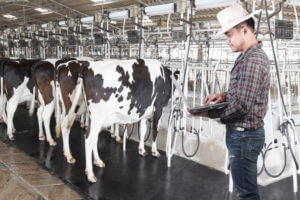Ricochet is the best place on the internet to discuss the issues of the day, either through commenting on posts or writing your own for our active and dynamic community in a fully moderated environment. In addition, the Ricochet Audio Network offers over 50 original podcasts with new episodes released every day.
 More Robots Are Coming to Farms. How Does This Affect the Immigration Debate?
More Robots Are Coming to Farms. How Does This Affect the Immigration Debate?
 Yet another reason to marvel at the lack of attention to technological change during the election. Lots of talk about immigration, but overall a backward-looking debate. For instance: Bloomberg reports about the shortage of farm workers — “crop pickers” — as “immigration slows, deportations rise and the prospects of congressional reform look remote.”
Yet another reason to marvel at the lack of attention to technological change during the election. Lots of talk about immigration, but overall a backward-looking debate. For instance: Bloomberg reports about the shortage of farm workers — “crop pickers” — as “immigration slows, deportations rise and the prospects of congressional reform look remote.”
Will the crops rot in the field? Will farmers do nothing in response? Turns out, not so much. Again, Bloomberg: “That’s forcing more growers to invest in machines that reduce human involvement in the production cycle.”
Yes, supply and demand still work! And right now that interplay is more and more beginning to favor machines or man in the field. More from Bloomberg reporters Alan Bjerga and Mario Parker:
Published in Economics, Science & TechnologyMechanical tomato-pickers began showing up in California in the late 1960s, after the end of a program that allowed temporary Mexican harvest workers into the U.S. In American dairies, which operate year-round and struggle to find workers under the government’s six-month H-2A farmworker visas, farmers have been shifting to robots that do everything from milking to feeding to cleaning the cows.
Even with all the technological advances, there are many crops that still require human hands, at least for now, said Wallace Huffman, an agricultural economist with Iowa State University in Ames. Machines typically work better for foods grown for processing rather than those sold in grocery stories, because many consumers demand an unblemished appearance, he said. “The soft fruits, the berries, the strawberries and blueberries are very delicate,” Huffman said. “They can easily be bruised and smashed, even by hand. Trying to move to mechanical picking is difficult.”
Still, with new devices being developed and Trump’s push to limit illegal immigration, the industry is accelerating its shift to automation. “Labor shortages are the main driver of the economics of what we’re doing,” said Charles Grinnell, the chief executive officer of Harvest Automation Inc. in Billerica, Massachusetts, which produces robots for $32,000 apiece designed to harvest plants in greenhouses. “It’s hard to know if it’s the election of Trump or something else. But there really is a sense from our customers that, ‘Hey, let’s get this done.’ ”




Actually, there is something unique about the situation described by Mr. Pratt, which is described in the book he recommended as well as in the OP. At present, machines can’t pick and handle the fruits carefully enough to produce the relatively expensive stuff that people will buy in a store. Apples for applesauce? Yes, that can be more mechanized. But perfect, bright red apples to be sold in boxed sets for eating, no. There is a good market for those, they are important to the income stream of fruit growers, and it can’t be done by machine.
My understanding is that most of the research into automation of these processes is in developing breeds of plants that can better withstand the automatic picking machines. Unfortunately, there is usually a tradeoff – these tend to be less tasty fruits.
But I’m sure there are people at work developing robots that can pick apples and cherries with as much loving care as humans – and maybe will do even better than humans at some point. But that will be a while a-coming. In the near term, the plant breeders are coming up with varieties that provide a better return on the research investment.
I will second the recommendation of this book. I listened to it a week or so ago, thanks to a coupon code provided by Mr. Pratt. It may not have had the effect on me that the author intended, since I’ve been familiar with the context for stories like this for many years. But still, it was worth listening to. I learned a few new things and Mr. Pratt does a good job of narrating the audio version. I may put a review on Ricochet, but then I still haven’t finished my article about my own career as a migrant farm worker – an article that I started long ago.